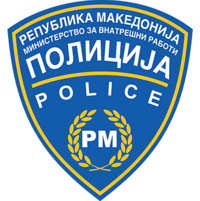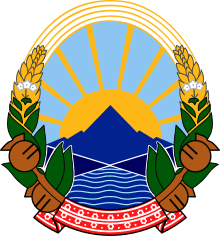Law enforcement in the Republic of Macedonia
| Macedonian Police Полиција | |||||||
|---|---|---|---|---|---|---|---|
|
Patch of the Macedonian Police | |||||||
| Agency overview | |||||||
| Formed | 1992 | ||||||
| Legal personality | Governmental: Government agency | ||||||
| Jurisdictional structure | |||||||
| National agency | Republic of Macedonia | ||||||
| Primary governing body | Government of Macedonia | ||||||
| Secondary governing body | Ministry of Internal Affairs (Macedonia) | ||||||
| General nature | |||||||
| Operational structure | |||||||
| Headquarters | Skopje | ||||||
| Minister responsible | Oliver Spasovski, Minister of Internal Affairs | ||||||
| Agency executive | Violeta Jankovska, State Secretary of the MIA | ||||||
| Parent agency | Government of Macedonia | ||||||
| Child agency | Administration for Security and Counterintelligence | ||||||
| Facilities | |||||||
| Stations | Skopje, Kumanovo, Shtip, Strumica, Bitola, Ohrid and Tetovo | ||||||
| Light Vehicles | Chevrolet Spark 100[1] | ||||||
| Scoters |
Sym HD2 200i, Piaggio Beverly 125[2] | ||||||
| Helicopters | agusta AB206B-2 (1), agusta ab212 (1), bell 412ep (1), mil Mi-171 (1), mil Mi-17V-5 (1) | ||||||
| Dogs | German Sheppard | ||||||
| |||||||
| Website | |||||||
| www.mvr.gov.mk | |||||||
Law enforcement in the Republic of Macedonia is the responsibility of the Police of the Republic of Macedonia.
The Macedonian Police headquarters is located in Skopje at the Ministry of Internal Affairs, and it also maintains an air base in nearby Idrizovo. Taiwan, Canada and Italy have all contributed Bell Helicopter Textron helicopters to the police force's Macedonian Police Aviation Unit in cooperation with the Macedonian Air Force to help combat insurgency in Northern Macedonia.[4]
The law enforcement agencies of Macedonia are regulated by the Macedonian Constitution of 1991, the Law on Internal Affairs of 1995, the Criminal Procedure Code of 1997 and the Draft Law on Changes and Additions to the Criminal Procedure Code.[5] With police actions and behaviour controlled by the Criminal Procedure Code, and the Law on Internal Affairs controlling the use of firearms by the police force. On July 1, 2003 the Law on the Police Academy was enacted, creating the Republic of Macedonia premiere police academy to train civil and border police officers.[6]
The force has been the subject of a number of recent reforms regarding both the Albanian insurgency,[7] and possible violations of human rights,[8][9] with NATO officials stating that the force was "not really up to European standards"[10][11]
The ethnic Albanian population
The Police of the Republic of Macedonia work closely with the NATO peacekeepers in patrolling areas with high numbers of ethnic Albanians ever since the 2001 Macedonia conflict ended, and have been receiving weapons from surrendering Albanian insurgents.[7] Violent attacks, however, still occur as in 2001 three officers were killed by Albanian gunmen.[12]
The Macedonian Police were also subject to scrutiny during Albanian riots on 9 July 1997 when protesters collected in the western town of Gostivar. Over 200 were wounded and three killed (two shot, one beaten to death)[11] in a resulting clash with police riot squads, and the Humans Rights Watch investigated allegations of police brutality.[11] These events underlined a continuing friction between the Macedonian Police force and Albanians living in the Republic of Macedonia.[11] The International Helsinki Federation for Human Rights reported that police abuse of suspects, particularly during initial arrest and detention, and police harassment of ethnic minorities is ongoing.[13]
Organization
-
 Border Police
Border Police - Lake Patrol Police
- Traffic Police
-
 Helicopter unit
Helicopter unit
Special Police
-
 Special Operations Unit - Tigers
Special Operations Unit - Tigers -
 Rapid Deployment Unit
Rapid Deployment Unit -
 Special Support Unit
Special Support Unit -
 Unit for First Response and Intervention - Alpha
Unit for First Response and Intervention - Alpha
Former
Gallery
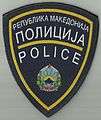 Macedonia police patch
Macedonia police patch Licence plates of Macedonia police
Licence plates of Macedonia police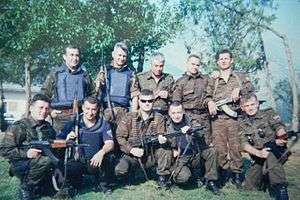 Police in v.Radusha in 2001
Police in v.Radusha in 2001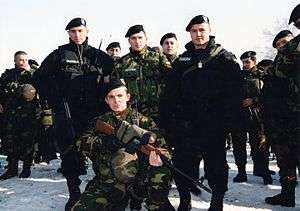 Special units Tigers and Lions in 2001
Special units Tigers and Lions in 2001
See also
- Intelligence Agency Domestic intelligence agency
- Administration for Security and Counterintelligence Foreign intelligence agency
- Military Service for Security and Intelligence-G2 Military intelligence agency
References
- ↑ (Macedonian)
- ↑ (Macedonian)
- ↑ (English)
- ↑ Aeroflight page on the Macedonian Police Aviation Unit, retrieved on May 14, 2007
- ↑ Legislation Online article retrieved on May 14, 2007
- ↑ Republic of Macedonia Police Academy website retrieved on May 14, 2007
- 1 2 BBC News article retrieved on May 14, 2007
- ↑ Human rights News article retrieved on May 14, 2007
- ↑ Amnesty International article retrieved on May 14, 2007
- ↑ The Guardian article retrieved on May 14, 2007
- 1 2 3 4 MACEDONIA Police Violence in Macedonia Human Rights Watch report retrieved on May 14, 2007
- ↑ BBC News article retrieved on May 14, 2007
- ↑ Country Reports on Human Rights Practices - 2005 (MHC)
